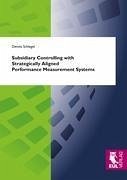Due to the growing importance and complexity of company groups and a proceeding decentralisation, subsidiary controlling is becoming more and more important. Performance measurement systems are a key instrument of subsidiary controlling. The correct use of performance measures combined with the right incentives can help reduce information asymmetry between the corporate centre and subsidiaries and at the same time ensure an orientation toward corporate objectives on all levels. In this book, the concept of performance measurement systems in the context of subsidiary controlling is explained. One focus is the thorough discussion of financial performance measures and their use in subsidiary controlling. Particularities in subsidiary controlling are for instance the determination of divisional cost-of-capital for value-based management and the aggregation of measures to the corporate level. The second focus is the design of performance measurement systems depending on certain characteristics of the company and its environment. It is emphasised that there is not one right way of designing controlling systems. Instead, they have to be aligned to certain situational variables such as strategy, organisational structure or environmental uncertainty. For example, managers of business units that pursue differentiation strategies should be evaluated by more non-financial performance measures than managers of business units with a low-cost strategy. The book can be used as guidance for practitioners concerned with the design of performance measurement systems ¿ for example corporate controllers, management consultants or investment managers in holding companies. It also provides a starting point for academics that intend to conduct further research on related topics.
Bitte wählen Sie Ihr Anliegen aus.
Rechnungen
Retourenschein anfordern
Bestellstatus
Storno









